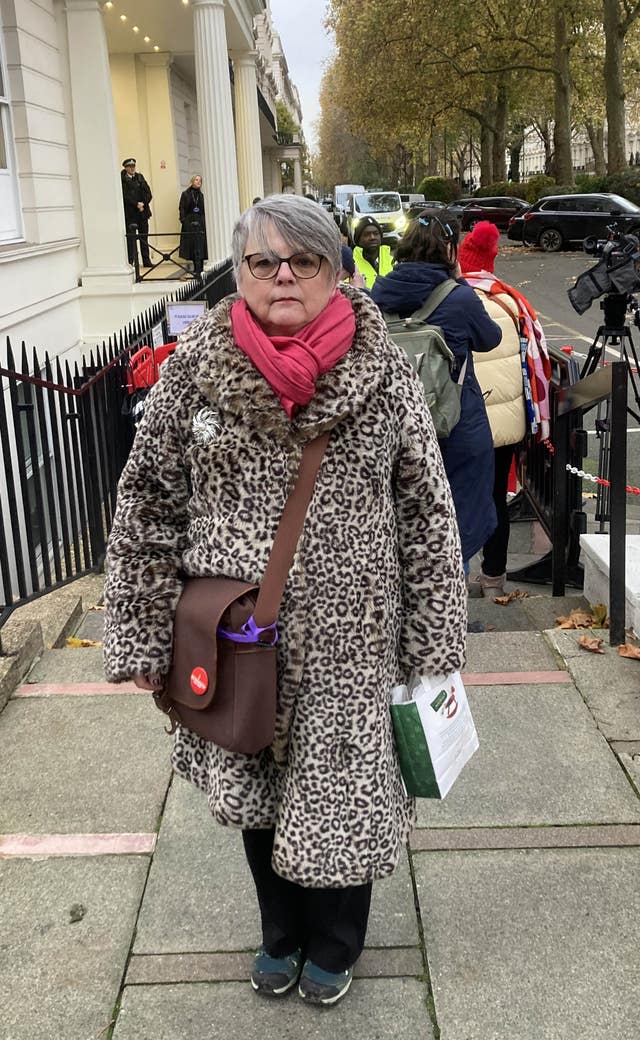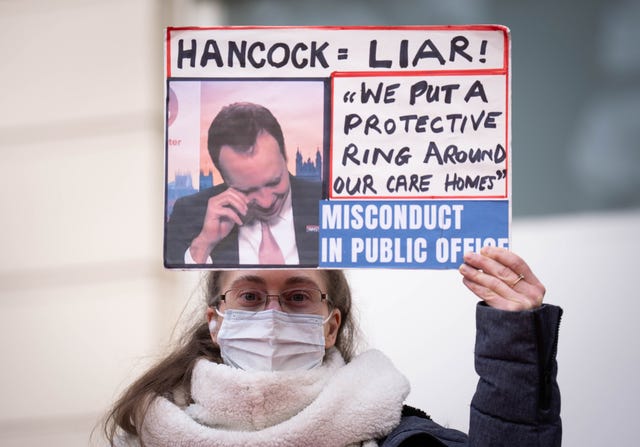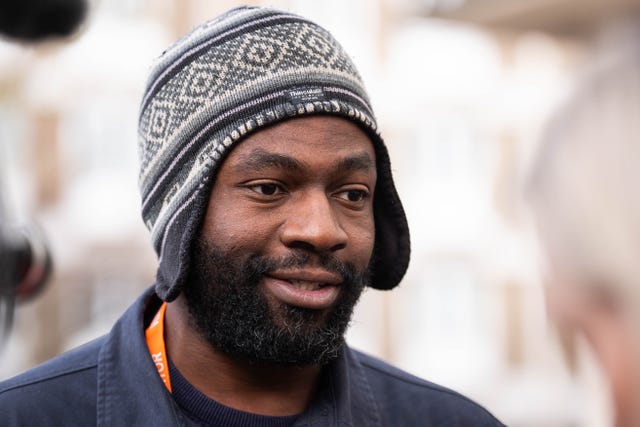Bereaved families demonstrated outside the UK Covid-19 Inquiry, holding pictures of loved ones and rolling out a red carpet with the words “let bereaved families give evidence”.
A group of people stood in front of the carpet outside Dorland House in London during the lunch break, after former health secretary Matt Hancock gave evidence in the morning.
Lobby Akinnola, 33, said he went to the inquiry on Thursday to “act as a voice for people who can’t speak”.
Mr Akinnola’s father, Femi Akinnola, died at the age of 60 in April 2020 after testing positive for Covid.
Mr Akinnola said he was concerned Mr Hancock was using the inquiry to “rehabilitate his public image”.

He said: “I think he’s come across somewhat combative, somewhat defensive, it’s felt, you know, multiple times the representation for the inquiry has had to ask him to let her finish the question and not interrupt, it just makes me question like, what is the purpose for him in giving evidence?
“Because the point of this inquiry is to learn from mistakes and to save lives, and I worry that he’s trying to use this opportunity to rehabilitate his public image.
“I feel like we’ve heard a lot about how well he did, how he did everything right, and how it was other people’s fault that things went wrong.”
He added: “I’m here to act as a voice for people who can’t speak. It’s a campaign for justice and I believe that justice requires change.

“It requires a change, and the change that we want to see is making a society that is fairer and more prepared and so that when crisis hits, it’s not the same people again and again who are having to bear the brunt of it, while others, you know, have the luxury of attending parties and seeing themselves as separate from society.”
Barbara Herbert, from Covid-19 Bereaved Families for Justice UK, said: “Politicians are using the inquiry to defend their legacies, while bereaved families are being excluded from giving evidence.
“Our evidence isn’t about sob stories, it is about honouring the legacy of our loved ones by making sure lessons are learned from the ways in which they died.
“We hoped in Module Three that there would be more room for families to speak about the impact of the pandemic on health systems and those who should have been protected by those systems. But only two of our witnesses have been called to give evidence.”
Mandy Phillips, who booed at Mr Hancock as he walked into the UK Covid-19 Inquiry building, said she believes he “should never have been health secretary”.

Ms Phillips, 63, who is a member of the Covid-19 Bereaved Families for Justice group from Thames Ditton in Surrey, said “we didn’t learn enough from the first (Coronavirus) wave”.
She added: “So I want to come and I want to hold him to account, basically. And I think it is important that we just sit there, and in my case I will just sit at the back and glare at him basically.”
Sarah Steven, 52, a member of the group Clinically Vulnerable Families, told the PA news agency outside the UK Covid-19 Inquiry that “today is really key for us but we’re not expecting to hear anything we don’t already know”.
Ms Steven, who was clinically vulnerable during the pandemic, described the end of lockdown rules in July 2021 as like “falling off a cliff edge” with “no support”.
Another member of the group, Andrea Barrett, 30, said she caught Covid, it developed into long Covid, and now she is not able to work full time.
During Mr Hancock’s evidence, about two dozen people watched from the public area of the Covid-19 inquiry.
Some held pictures of loved ones and made notes, while others wiped away tears when a video of evidence from Professor Kevin Fong, former national clinical adviser in emergency preparedness resilience and response, was played to the inquiry, as he described what the situation in one hospital was like during the pandemic.
Mr Hancock also left Dorland House after giving evidence to calls of “liar” from demonstrators.





Comments: Our rules
We want our comments to be a lively and valuable part of our community - a place where readers can debate and engage with the most important local issues. The ability to comment on our stories is a privilege, not a right, however, and that privilege may be withdrawn if it is abused or misused.
Please report any comments that break our rules.
Read the rules hereLast Updated:
Report this comment Cancel